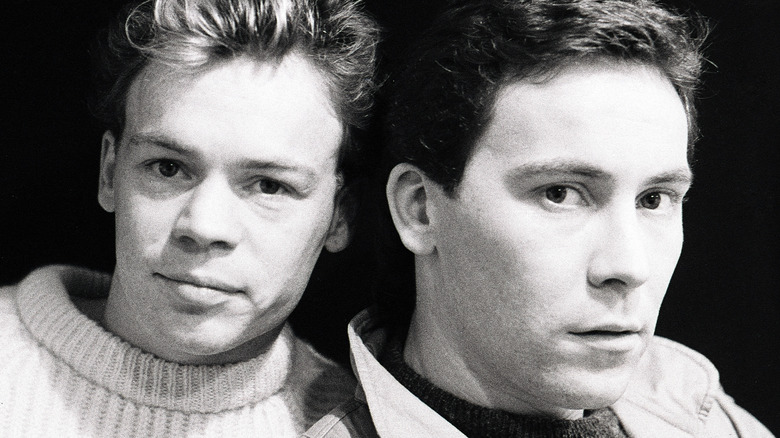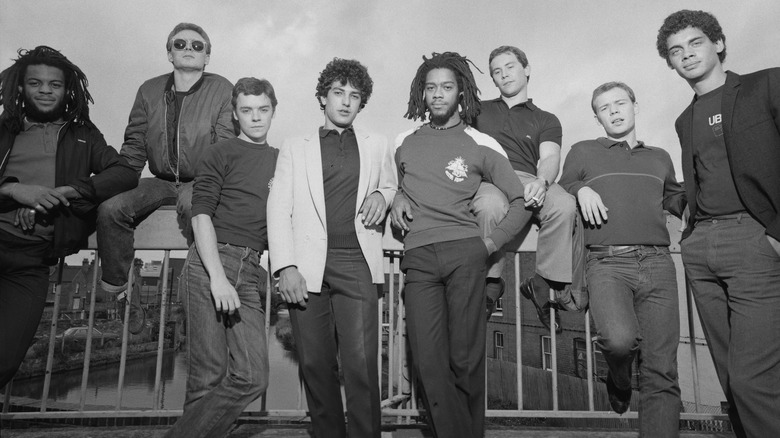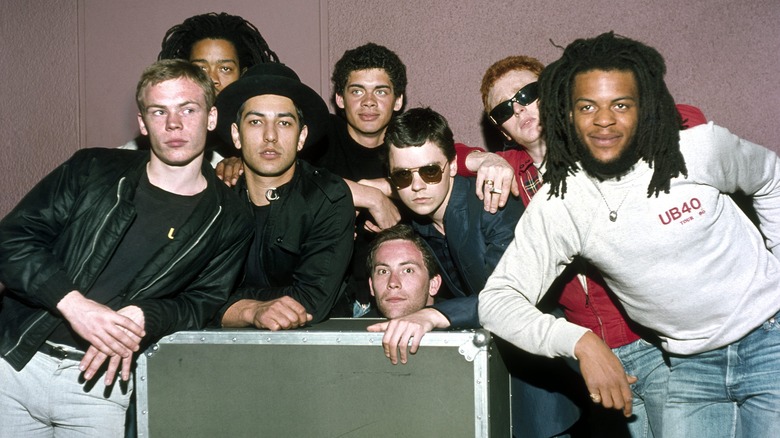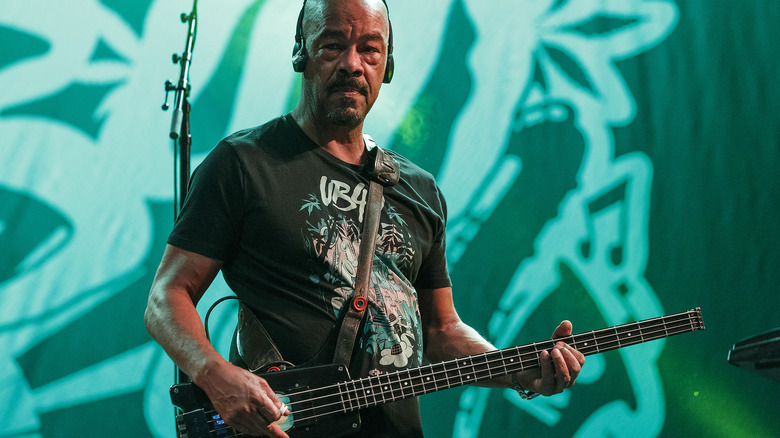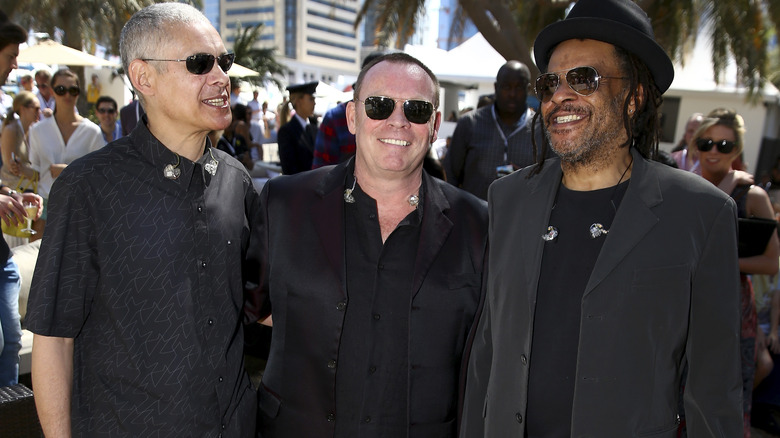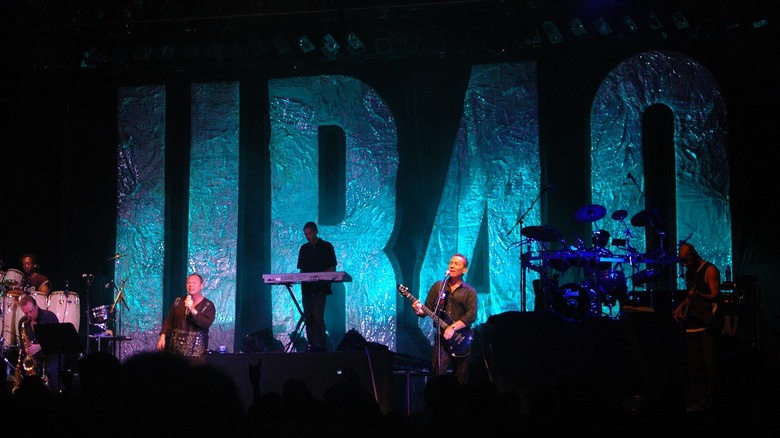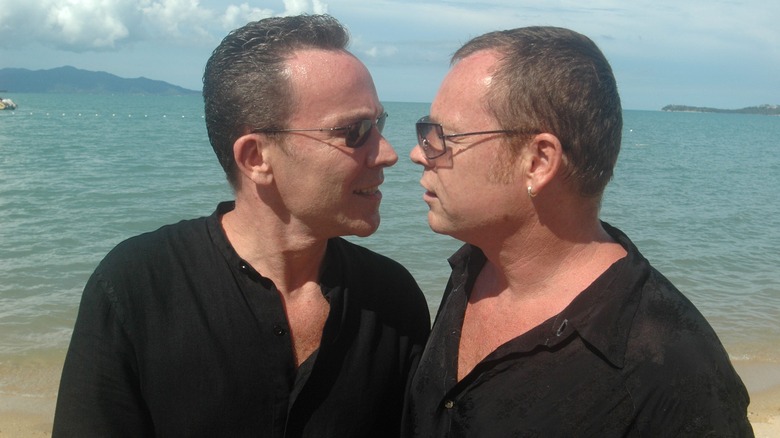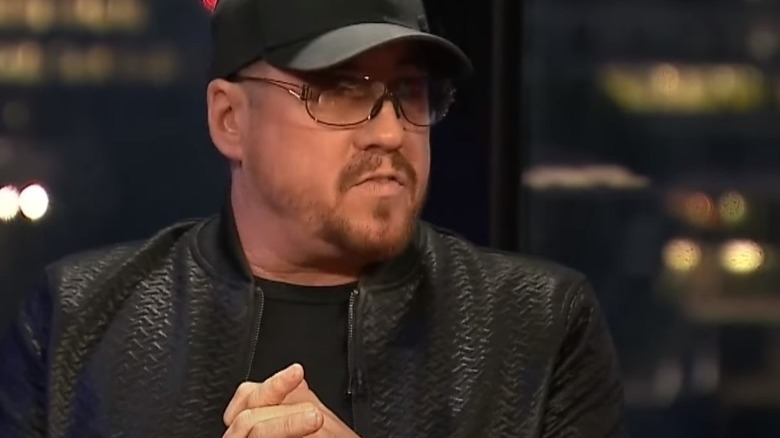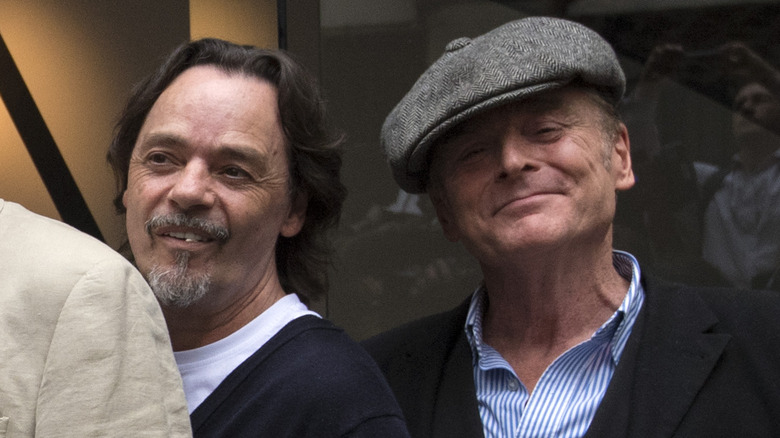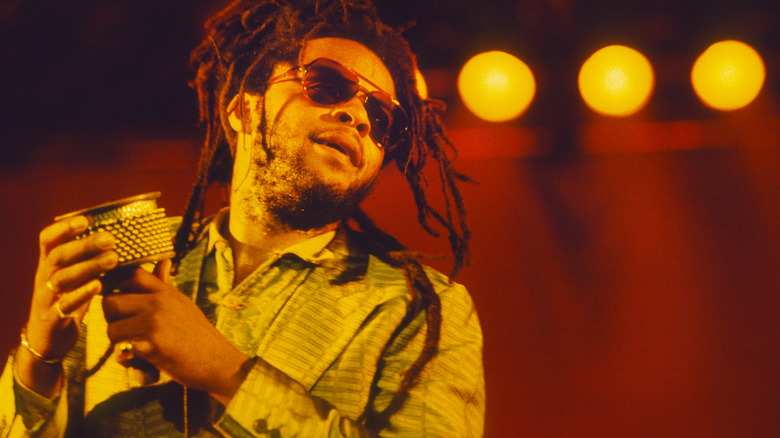Tragic Details About UB40
The story of UB40 starts like so many others: A group of working-class friends in Birmingham, England, got together and started a band. They played what they loved to listen to, taking inspiration from reggae and marrying that with the pop sounds of the late 1970s.
The story continued, however, in a way that many bands could only dream of. The Guardian says that they were discovered by The Pretenders' Chrissy Hynde, and after she asked them to go on tour with her, they went on to become one of the bands with a sound that defined the 1980s. And it's not surprising: They're one of those groups with a sound so distinctive, there's no question about who's on the radio.
Still, life behind the scenes of UB40 has been nowhere near as chill as their music might suggest they are. From difficult childhoods to the bleak existence that gave them their name to a family torn to pieces to bankruptcy and lawsuits, their real-life story is the stuff of a Netflix series that doesn't seem like it could possibly be real ... but it is.
They've been candid about how militant lyrics came naturally
UB40 formed in the working-class city of Birmingham in the late 1970s, and given that they took their name from the form U.K. residents fill out for unemployment benefits; that kind of sums up the prospects that many band members found themselves facing. Conditions were dire: A 1981 presentation to Parliament cited unemployment numbers for the East and West Midlands (which includes Birmingham) that had risen from 188,600 in 1979 to nearly half a million — with experts suggesting the real number was closer to 3 million.
Original lead singer Ali Campbell told The Guardian, "We were eight people who had been unemployed since school, trying to wade through Thatcher's quagmire of s***, and then sing about it." And, in some cases, talk about it — The Washington Post recalled Campbell and drummer Jim Brown telling a group of school-age children not to bother with the educational system, because it was absolutely going to fail them. In 2014, Campbell spoke with The Guardian about growing up. He described his neighborhood as the type of place where he'd started smoking at 8 years old — the same year he was arrested on burglary charges.
Terence "Astro" Williams, UB40's co-vocalist, explained that they were singing about problems, issues, and topics — like racism — that they had a front-row seat to while growing up. "We found it harder to write love songs than militant lyrics, because it was a lot easier to write about stuff that you had witnessed or read about," Williams explained.
The Campbell brothers definitely didn't have their father's approval
At the core of UB40 were a group of brothers — Ali, Duncan, and Robin Campbell were all a part of the band from the early days, and a fourth brother, David, acted as their manager. They were the sons of Scottish folk musician and vocal Communist supporter Ian Campbell, and his political leanings are going to get super relevant (via The Guardian).
The elder Campbell was one of the few folk artists to hit the U.K. charts, so he was less than impressed when his sons told him they were starting a band with a sound inspired by reggae. Ali told The Guardian: "He told me to f*** off. He just thought we were stupid." Once he realized his sons were going to be using their music to make a political statement, they got some grudging respect. Still, Ali has been clear that he doesn't share his father's political views, once citing UB40's 1984 trip to Russia as giving him all the reasons he needed to tell his father that no, he may have been firmly on the left, but he definitely wasn't in favor of Communism.
Not all of the Campbell brothers had such a divisive relationship with their father, though. Robin Campbell talked to Noise11 and described how they would sing reggae versions of songs just to entertain him, and he also credited his father with giving him songwriting tips. Even then, he had to acknowledge the initial disappointment.
Bassist Earl Falconer was driving drunk during an accident that killed his brother
In 1998, The Morning Call did a piece examining UB40's shifting sound. "Red Red Wine" was a hit, their lyrics were getting a little less political, and they cited life experience — and lost relationships — for their newfound ability to write songs about love and loss. Amid the examination of their new sound was a relatively small paragraph about a huge tragedy: In 1987, their soundman, Ray Falconer, was killed in a car accident. There was, however, much more to it.
In June 1988, the Los Angeles Times reported that Ray's brother, bassist Earl Falconer (pictured), had started his 18-month jail sentence for being the driver of the car Ray was in when he was killed. After the accident, Earl tested at about two times the legal limit for alcohol.
It not only meant loss, and the change in UB40's sound, but also Earl Falconer's temporary break from the band, even after he got out of jail. Robin Campbell told The Washington Post that he was getting back in performing shape, and he added, "I think it's made us more serious about things. It's brought us even more close together. ... I mean, we can't fail now."
Founding members quit amid accusations of mismanagement
UB40 may have made it through the 1980s and '90s, but in the 2000s, things really started to go sideways for them. It started with the bombshell announcement from Ali Campbell (pictured), lead singer and one of the brothers that founded the band in the first place.
Campbell was quitting, and posted a statement that didn't pull any punches, saying (via CBC): "I have been deeply unhappy with administrative practices and with many decisions that have been made in recent years. I have an ongoing investigation into the handling of my business affairs in relation to UB40. Suffice it to say, I felt I had no other option but to resign from my band."
Although Campbell claimed he had been planning on working on both music for UB40 and his solo career until his then-undisclosed problems with administration, the remaining seven band members were quick to disagree. Their official statement (via NME) claimed that not only was his move just to get out of touring and group projects in favor of his own, but that he'd been working with an attorney for weeks while telling everyone else — including the band — that everything was fine. Initial denials of personal conflicts were very quickly disputed.
Two versions of UB40 formed around a rift between brothers
UB40 had been together for more than 30 years by the time Ali Campbell left in 2008, and Smooth Radio says that after that happened, things got ugly. His departure was followed by that of Mickey Virtue and Terence "Astro" Williams, who both condemned the band's management.
That left Duncan and Robin Campbell in the original group. They decided that Duncan would step up as lead singer and they would keep going ... but then, Ali, Virtue, and Williams decided they were going to make their own version of the band, and also call it UB40 (pictured). Does that sound like the makings of a lawsuit? It absolutely was, and in 2016, Birmingham Live reported that it had gone all the way to the High Court, with both sides saying that they were the ones entitled to the name "UB40."
The final decision in the matter is a strange end to an odd saga. According to Swan Turton, both sides were equally right: Since UB40's management company, DEP International Limited, had ceased to exist in 2009 after a bankruptcy case ended with the liquidation of UB40's assets, the sale of their back catalog, and the dissolving of their management company, there had been no UB40 to argue over. Sort of. Bottom line? Since they both had an equal claim, the whole thing was dismissed.
UB40 was declared bankrupt
In 2021, The Guardian quoted Ali Campbell as saying, "I can't keep hold of money. I've made millions, and spent it all." It was after his 2008 departure from the band that UB40 declared bankruptcy in a high-profile way. Drummer Jim Brown spoke about it with This is Money, saying that the bottom line was that Campbell had left when a tour had been arranged and advances had been paid. With the band falling apart, there was suddenly no way to pay those tour expenses.
What Brown described was shocking: Not only were they forced to sell their back catalog, but everything from cars to their instruments was seized in order to pay down their debt. He explained: "It is amazing how many men in suits have ripped us off over the years. We were taking in the money left, right, and center at one point, and a whole army of people came out of the woodwork to tell us what to do with it. Most of them turned out to be full of s***."
Rolling Stone says that the Birmingham County court ordered assets seized and ruled that the companies and individuals they owed money to would be paid — eventually, out of the royalties earned from their back catalog. Ali Campbell was named in the bankruptcy, too, and told The Telegraph: "This is the very reason why I left the band. This was my biggest fear when I was with them ... and no one can say I didn't warn them."
The Campbell brothers are no longer on speaking terms
When Ali Campbell (right) talked to The Guardian in 2014, he told them it had been six years since he had spoken to his brothers after the split and the lawsuit. "I couldn't believe the skullduggery," he said. "I don't see any way back for things now."
He was serious, too. Their father, Ian Campbell, passed away in 2012, and although it may have been a good time to make amends, Ali chose not to go to the funeral. Brothers Robin (left) and Duncan — who were still in the process of fighting Ali for the UB40 name — told Birmingham Live that they made it a point not to discuss things with their 83-year-old mother, who hadn't taken sides, and added, "It's all very sad. He just took on a new life, went elsewhere, and has kind of cut us all off. ... It's his decision. He's a big boy. I'm not losing sleep over it anymore."
Fast forward to 2020, and Birmingham Live revisited the feud to see if amends had been made amid the pressure of the COVID pandemic or Duncan Campbell's stroke and subsequent hospitalization. To say that no amends were in sight would be putting it lightly, as Ali commented, "I'm just happy to carry on promoting reggae and our version of UB40. ... I have no contact with them. I only get to hear what's happened like everyone else. I don't know what's going on, but I know he's recovering."
Vocalist Matt Hoy was allegedly fired over COVID
Matt Hoy was hired on as a part of the UB40 splinter group headed by Ali Campbell, but in June of 2021, he was forced to quit after 11 years with the group. It wasn't until the summer of 2022 that he spoke to GBN about what had happened, and he wasn't happy about it.
Hoy had opted out of getting the COVID vaccine, but he told the news outlet that he had a very good reason to: He had been advised against getting the vaccine by his doctors, who cited a previously existing heart condition for only part of the reason. Hoy previously had a flu shot, and said, "... due to my heart condition, I experienced severe adverse reactions including huge swelling in my lymph nodes, and my heart fell out of rhythm." He continued, "I was advised by my general practitioner not to have the COVID vaccine."
Hoy's doctor publicly confirmed the diagnosis, and Hoy stated that he is by no means an anti-vaxxer — he cited countless tours and travels around the world to many places where vaccinations against things like yellow fever and malaria are required for travel. While UB40 officially wished him well and said there were no hard feelings, Hoy went on to say: "To have your entire career taken away from you over a jab is a terrifying prospect. This is discrimination. Being in the band was like having a second family, where was the loyalty?"
Several devastating incidents have happened at concerts
The chill reggae sound of UB40 might seem like it makes them one of the last bands to have to worry about concert-going tragedies, but that hasn't been the case.
In 2021, the Evening Standard reported that several people had been hospitalized after being hit by a car that drove into the crowd leaving a UB40 show. Injuries were reported to be not life-threatening, and although police were quick to reassure the public it wasn't being considered a terrorist attack, they were looking for any information anyone could provide on the driver.
Another UB40 concert had made BBC headlines in 2014. While sure, anyone going to a concert expects things to be loud, this one got a little too loud. Not only did dozens of people leave the show because it was too loud — the bass was described as "altering heart rhythms," — one woman began bleeding from her ear afterwards. While she had a preexisting condition, the concert and the venue were condemned for not putting up adequate warnings, and not providing earplugs for those who needed them.
The death of Brian Travers
Brian Travers (right) was one of the original members of UB40, not only their saxophonist but a songwriter and arranger as well. When Variety announced he had passed away in 2021, it was at the relatively young age of 62. The cause was cancer, and his death came several years after the 2019 discovery of a brain tumor.
Birmingham Live says that Travers first suffered a seizure just after his 60th birthday, and had emergency surgery to remove a double tumor from his frontal cortex. The surgery had been a success — he went home the next day — but the following year, he underwent surgery again for another tumor.
He remained optimistic throughout it, saying, "I have no fears about a second operation. After the first operation, I was given a cup of tea and then told I was okay to go home." He threw himself into his work, holding recording sessions with his son and his father, and posting videos throughout the pandemic with the sole goal of lifting the spirits of everyone going through lockdown regulations. Lockdown provided challenges for him, too: "I've never had a bucket list, but I did have some dreams," he said.
His death was announced on Aug. 23, 2021.
The death of Terence Astro Wilson
Not long after the death of Brian Travers, UB40 announced the passing of another longtime member. According to the BBC, Terence "Astro" Williams passed away in November 2021, at just 64 years of age. Ali Campbell tweeted, "We are absolutely devastated and completely heartbroken to have to tell you that our beloved Astro has today passed away after a very short illness. The world will never be the same without him."
The other version of UB40 tweeted their condolences as well, with Rolling Stone citing his contributions — particularly, his toasting, or spoken word lyrics — that made UB40 a huge part of who they were. They also quoted Wilson as saying that his life's work was to help publicize reggae and expose more people to it on a mainstream level: "I'm on a mission 30-plus years ago to try and help popularize reggae music," he said. "What we need to get at is people who haven't listened to reggae before but could be interested. They just need somebody to show them the way. That's where we're at."
And that's exactly what he did.
